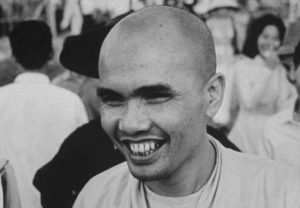
A state of emergency over the growing homeless population and the need for social services has recently been declared in the city of Seattle and King County in the US’s Washington State. According to city mayor Ed Murray, “More than 45 people have died on the streets of the city of Seattle this year and nearly 3,000 children in Seattle public schools are homeless.” (The Seattle Times) Buddhist non-profit organization Patacara Community Services (PCS), named after the famous disciple of the Buddha, is extending a helping hand—the volunteers, Buddhists from in and around the Seattle area, meet on a regular basis to cook and serve food to Seattle’s homeless, and last year also taught meditation to its homeless youths.
According to Polly Trout, PCS’s founder, the group was guided and inspired to take action directly by Patacara’s story, which is from the Therigatha (Poems of the Early Buddhist Nuns) and appears in the Pali Canon. It tells the moving tale of a young mother, the beautiful daughter of a wealthy merchant, who endures the tragedy of losing her husband, children, parents, and brother all within a short space of time before finding refuge and salvation in the teachings of the Buddha. . . .
Pregnant, Patacara goes into labor during a heavy storm while traveling to her parents’ home together with her husband and son. While attempting to construct a shelter so that Patacara can give birth safely, her husband is bitten by a snake and immediately dies. Distraught, but with a newborn baby to care for, Patacara attempts to continue on to the safety of her parents’ home. Encountering a storm-swollen river, she asks her elder child to wait on the riverbank while she carries her newborn baby across. Reaching the other side, she lays the baby down and heads back across the river to retrieve her other child. When she is almost halfway, however, she sees a hawk swoop down and snatch up the newborn child. She cries out to scare it away, but still it makes off with the child. Hearing his mother’s cries, Patacara’s elder child thinks she is calling out to him and enters the river, but is swept away by the strong current. Devastated by the loss of both children, Patacara continues on alone to her ancestral home only to learn that it has burned down, killing her parents and brother. Driven insane with grief, she wanders aimlessly, naked and alone, an object of ridicule and violence:
“Thereat grief maddened her, so that she was not even aware of her clothes slipping off. Wailing in her woe, ‘My children both are gone, and in the bush dead lies my husband; on one funeral bier my mother, father, and my brother burn.’” (Rhys Davis and Norman 1909, 57)
Then one day, Patacara wanders close to where the Buddha, Shakyamuni, is giving a teaching. Although the assembly warns him not to approach the desperate woman, the Buddha places himself directly in Patacara’s path. What happens next is perhaps one of the most poignant moments in all of Buddhist history: calling her his sister, the Buddha tells Patacara to regain her presence of mind, whereby she immediately recovers her sanity.
Now clad in the outer garment of a bystander, Patacara prostrates herself at the Buddha’s feet and begs him for help. Shakyamuni responds by instructing her in the Dharma, whereupon she immediately realizes the impermanence of all phenomena. Not long afterwards, she asks to be ordained as a bhikkhuni (female monastic) and eventually attains enlightenment, becoming a teacher to many other bhikkhunis.
Through meeting the Buddha and encountering his wisdom, guidance, and compassion, Patacara, whom society had discarded, is transformed and overcomes her grief to become a light to others, instructing them in the Dharma.

Photo by Brittney Ferara
Now, more than 2,500 years later, the PCS volunteers gather in Seattle to prepare a meal of Creole red beans and rice to feed the homeless. Polly Trout said she named the organization after Patacara because it “operates programs designed to help us recover our presence of mind together” and because “many people don’t know that the Buddha taught generosity, so this is a way to demonstrate that.” A committed Buddhist, Polly found that she felt a calling to help the suffering as her own practice started to deepen.
In partnership with other organizations in Seattle, PCS serves 200 meals a month to fill gaps in services to feed the homeless. Its activities are funded by donations raised via PayPal through the group’s website. The volunteers both cook and serve the meals, sometimes freezing them for redistribution. They also help organize book drives for local shelters. While group members have been performing volunteer work in various capacities for the homeless and other underprivileged people for the past 15 years, PCS became a registered non-profit organization only in August 2014.
Describing the group’s mission, Polly says, “People who are struggling with homelessness are our neighbors, not a dehumanized ‘other,’ and we want to recognize that people are sacred. Food is a way to do that. Food is a symbol of spiritual nourishment.” Recalling the story of Patacara, she continues, “Many people on the streets need food and shelter. They need to be treated like humans, and that will remind them of their true nature.”
Polly feels that many of the meals made available to the homeless by other organizations are unhealthy, so the volunteers at PCS prepare vegan and vegetarian meals of the same quality that they would make for their own families. This, says Polly, offers a form of healing for those who live without permanent housing: “They know they are being treated the way I treat my own child.”
Many of the homeless people PCS encounters have never had caring parents, Polly observes, so being seen in the way the Buddha saw Patacara instigates a transformation process that carries extraordinary possibilities: “Patacara had trauma and she lost her mind and fell into mental illness, but due to the Buddha’s intervention, she healed, became enlightened, and became a teacher. I have met people that need the presence that the Buddha taught us to give.”
The result? Polly says she frequently receives e-mails of gratitude from former homeless people served by the organization who now have jobs, homes, and even families of their own. When asked how the members of PCS are able to maintain their own equilibrium when confronted by the suffering of others, Polly offers this: “We couldn’t do it without the Dharma; it’s the Refuge that carries the work.”

Future plans for PCS include finding a permanent base to function as a drop-in center, so that anyone facing a crisis can come to a safe place off the streets, have tea and a meal, address basic needs such as showering—and, most of all, feel safe and be treated with dignity and respect. PCS also plans to encourage inter-generational services, such as teens helping elders and elders helping babies. The organization hopes to expand to other cities in King County that offer few social services for the homeless.
Just as Patacara was ridiculed and discarded by society, so too are many of the homeless on US streets. The Buddha was able to see beyond the grief-stricken madwoman and offered compassion and an opportunity for Patacara to cultivate her enlightened potential. PCS can be said to be an extension of this teaching, offering homeless people and Buddhist practitioners an opportunity to re-enact Patacara’s story many years on.
References
Rhys Davis, C. A. F., and K. R. Norman, trans. 1909. Poems of Early Buddhist Nuns (Therigatha). Oxford: The Pali Text Society.
See more
Patacara Community Services
Mayor, county exec declare ‘state of emergency’ over homelessness (The Seattle Times)











